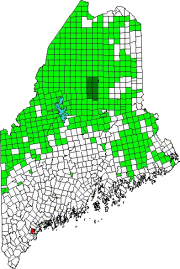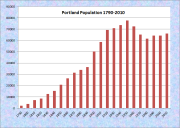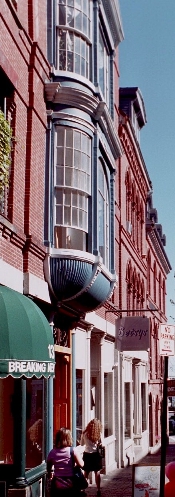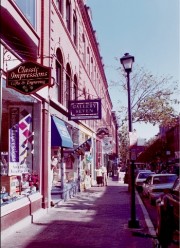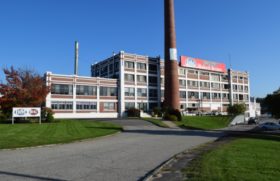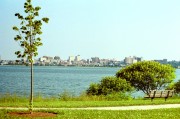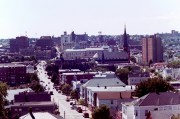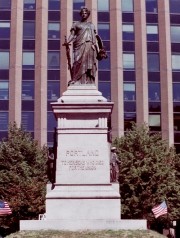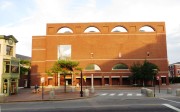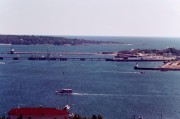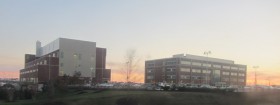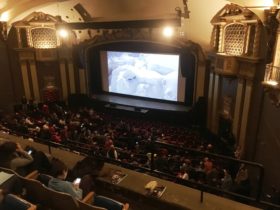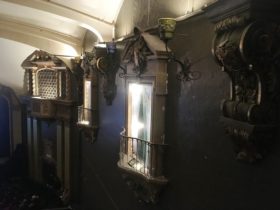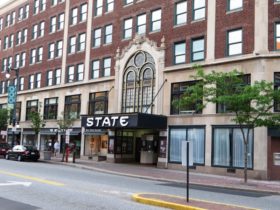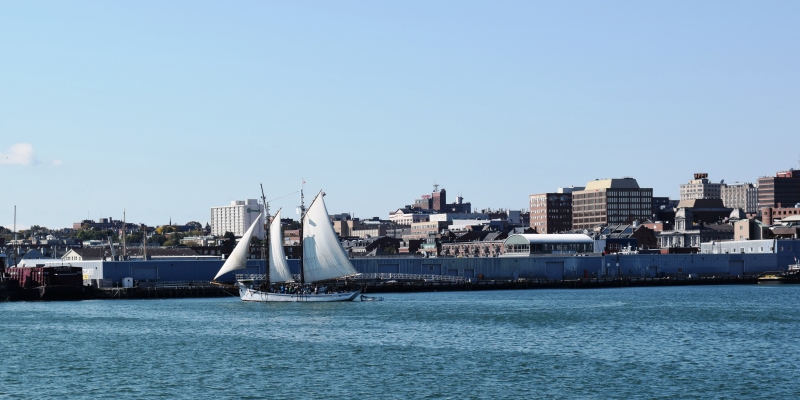
| Year | Population |
|---|---|
| 1970 | 65,116 |
| 1980 | 61,572 |
| 1990 | 64,157 |
| 2000 | 64,249 |
| 2010 | 66,194 |
| Geographic Data | |
|---|---|
| N. Latitude | 43:40:02 |
| W. Longitude | 70:17:26 |
| Maine House | Dist 36-43 |
| Maine Senate | Dist 27,28 |
| Congress | District 1 |
| Area sq. mi. | (total) 52.6 |
| Area sq. mi. | (land) 21.2 |
| Population/sqmi | (land) 3,122 |
County: Cumberland
Total=land+water; Land=land only |
|
Portland Harbor
Portland is Maine’s most populous city, located in Cumberland County, settled in 1632 and incorporated as a town on July 4, 1786 from a portion of Ancient Falmouth. The latter was later to be dissolved into Cape Elizabeth, Westbrook, and an additional portion of Portland, Stroudwater.
On March 26, 1833 Portland became a city. Deering was created as a town from a portion of Westbrook in 1871, then made a city in 1889, only to be absorbed by Portland ten years later.
The Indian name for the area was Machegonne, variously spelled. After much discussion, Fannie Hardy Eckstorm concludes the best interpretation is “shaped like a great knee,” referring to the peninsula on which much of the city sites.
It has had its share of mishaps: destruction in 1676 during King Phillips War, burned by the British in 1775*, and ravaged by fire in 1866.
Portland was the site of the 1819 State Constitutional Convention and served as the new State Capital from 1820 until the Augusta facilities were ready in 1827.
The fire of July 4, 1866 destroyed one-third of the city including city hall and much of the business district. Thousands were left homeless as the damage was estimated to be $12 million.
In 1903 the diverse economy supported twenty-seven labor unions. Nine were associated with manufacturing; five, with railroads; five, with the construction industry; three with shipping by sea or land.
With its large population, financial and legal services, cultural and historical attractions, and “Old Port” dining and shopping district, the City is the only true metropolitan area in the state. It is the county seat of Cumberland County, home of its sheriff’s department, registry of deeds, and courthouses.
Portland harbor is a working waterfront serving tankers, tourists, and fisheries, along with recreational boating from year-round and summer residents. Ferries connect the mainland to the many Casco Bay islands.
On land, the city is a transportation hub for airlines, buses, and the Amtrak rail service.
The City is the birthplace of Commodore Edward Preble, regarded as the “Father of the American Navy,” and of Nathaniel P. Willis, a very popular poet and journalist in the mid-nineteenth century. James A. Healy served as the Bishop of the Diocese of Portland, after having been ordained the first African American priest in 1854. Jean Hawley Gannett, media owner and philanthropist lived here.
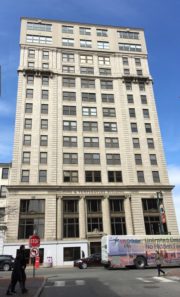 Thomas Brackett Reed, US. Representative and powerful Speaker of the U.S. House of Representatives in the late 19th century, was born in Portland and lived here most of his life.
Thomas Brackett Reed, US. Representative and powerful Speaker of the U.S. House of Representatives in the late 19th century, was born in Portland and lived here most of his life.
Portland was home to the famous architect John Calvin Stevens. It has also been home to several members of the U.S. Congress, including Thomas H. Allen, Thomas H. Andrews, Asa Clapp, Mark Harris, Peter Kyros, John Lynch, Ether Shepley, Albert Smith, Francis O. J. Smith, and John Wood. It was also home to U.S. Senator Frederick Hale. Robert Hale, cousin of Frederick Hale, was a U.S. Representative born in Portland in 1889.
The “Time and Temperature” building (right) is a landmark seen by all who travel I-295 and the Portland environs.
At the Fore River Sanctuary, managed by Maine Audubon Society, bird life abounds in a 76-acre area, and a number of hardwoods provide colorful contrast to stands of hemlock and white spruce. The two-and-a-half mile trail system passes within sight of Portland’s only waterfall.
Portland is the state’s major center of medical services, with the giant Maine Medical Center, Mercy Hospital, and scores of medical professional services spread throughout the city.
Legislator, Congress member, U.S. Attorney General, and Associate Justice of the U.S. Supreme Court, Nathan Clifford practiced law in Portland. Maine and national prohibition advocate Neal Dow was born here in 1804.
The city is a treasure of historic landmarks. They include the unique Victoria Mansion, the symbolic memorial in Monument Square, and the residence of Henry Wadsworth Longfellow, an integral part of the Maine Historical Society. It also hosts two institutions of higher learning: the Maine College of Art and the University of Southern Maine. The Art Deco State Theater opened in 1929. It is one of only two in Maine along with the Criterion in Bar Harbor. Portland Stage Theater is on Forest Avenue.
Portland City government encourages community participation and identity by hosting information about the activities of neighborhood associations on its Web Connector Project site. Neighborhood boundaries, influenced by historic factors, are clearly delineated within the city: Back Cove, Bayside, Deering Center, East Bayside, East Deering, Hobart Street Wildlife Sanctuary, India Street, Libbytown, Munjoy Hill, Nason’s Corner, North Deering, Parkside, Peaks Island, Riverton, St. John Valley, Stroudwater, University, West End, Western Promenade and Woodfords-Oakdale. Other nearby sites are the islands Great Diamond, Little Diamond, and Long Island.
Portland had one of the recommended “travel homes” in the post World War II guide “The Negro Travelers’ Green Book.” It was the Thomas House Tourist Home, 28 A Street, which served African Americans when many others did not.
 Congressional Medal of Honor:
Congressional Medal of Honor:
JOHN ANGLING; CHARLES J. BIBBER; HORATIO C. KING; CHARLES P. MATTOCKS; EDWARD N. WHITTIER
EDWARD C. DAHLGREN, HERBERT EMERY SCHONLAND
Korean War: CHARLES J. LORING, JR. Vietnam War: THOMAS J. MC MAHON
Form of Government: Council-Mayor-Manager.
National Register of Historic Places – Portland
Additional resources
*Several sources place the date as October 16th or 17th, 1775. However, the Library of Congress and others convincingly places the actual date as October 18, 1775. Stephen Longfellow, great-grandfather of Henry had been a schoolmaster in Portland. He purchased a farm in Gorham in 1775 when his home was burned in the fire resulting from British Captain Mowatt’s naval bombardment of the city.
Cole, Ronald F. Music in Portland, Maine, From Colonial Times Through the Nineteenth Century. 1975. (Thesis – Indiana University) [Microforms in University of Maine, Raymond H. Fogler Library; Maine State Library]
Connolly, Michael Coleman. The Irish Longshoremen of Portland, Maine, 1880-1923. 1988. (Thesis (Ph. D.)–Boston College, 1988) [University of Maine, Raymond H. Fogler Library, Special Collections; Maine State Library; University of Southern Maine (Portland). The Albert Brenner Glickman Family Library]
Flaherty, Paul Arthur. The Effect of the Civil War upon Portland, Maine. 1966. (Thesis (M.A.) in History–University of Maine at Orono, 1966) [University of Maine, Raymond H. Fogler Library, Special Collections]
Gould, William. Portland in the Past: With Historical Notes of Old Falmouth. Bowie, Maryland. Heritage Books. 1997. Reprint of 1886 edition.
Greater Portland Landmarks, Inc. Portland. Publisher Portland, Me. 1973.
Historic Towns of New England. New York. G. P. Putnam’s Sons. 1898.
Lovejoy, Myrtle Kittridge. This Was Stroudwater: 1727-1860. Portland, Me. National Society of Colonial Dames of America in the State of Maine. 1985.
Moulton, Augustus Freedom. Portland by the Sea: An Historical Treatise. Augusta, Me. Katahdin Publishing Co. 1926.
Moulton, John K. An Informal History of Four Islands: Cushing, House, Little Diamond, Great Diamond. Yarmouth, ME: J. K. Moulton. 1991.
Murray, Constance Carolyn. Portland, Maine and the Growth of Urban Responsibility for Human Welfare, 1830-1860. 1960
Portland Historic Resources Inventory, 1976. Augusta. Maine Historic Preservation Commission. 1976. Compiled and written by Earle G. Shettleworth, Jr. and John E. Pancoast; in cooperation with the Portland Planning Department and Greater Portland Landmarks, Inc.
Portland (Me.). Board of Aldermen. Report of the Committee Appointed by the Board of Aldermen of the City of Portland to Investigate the Causes and Consequences of the Riot, on the Evening of June 2, 1855. Portland. B. D. Peck, City Printer. 1855.
Portland Soldiers and Sailors: A Brief Sketch of the Part They Took in the War of the Rebellion. Portland, Me. Bosworth Post, Grand Army of the Republic. 1884. (Portland. B. Thurston & Co.)
Scontras, Charles A. Two Decades of Organized Labor and Labor Politics in Maine 1880-1900. Orono, Me. University of Maine. Bureau of Labor Education. 1969.
Willis, William. The History of Portland, from 1632 to 1864: With a Notice of Previous Settlements, Colonial Grants, and Changes of Government in Maine. Portland, Bailey & Noyes. 1865.


